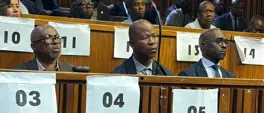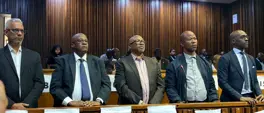Court finds deaths of 9 Life Esidimeni patients caused by negligence of Mahlangu & Manamela
Nokukhanya Mntambo
10 July 2024 | 16:10Former Gauteng Health MEC Qedani Mahlangu and the former head of the Mental Health Directorate, Makgabo Manamela, are among people the court says should be held accountable for their part in the tragedy.
JOHANNESBURG - After months of gruelling testimonies at the Life Esidimeni inquest, the Pretoria High Court has handed down a scathing judgment about the complicity of some government officials in the deaths of 144 mental health patients.
Former Gauteng Health MEC Qedani Mahlangu and the former head of the Mental Health Directorate, Makgabo Manamela, are among the people the court says should be held accountable for their part in the tragedy.
The inquest is an important step towards criminal accountability for the deaths by establishing whether there was any criminal activity or negligence on the part of state officials and NGO owners that contributed to the deaths of the patients.
The verdict comes almost a decade after the botched Gauteng Marathon Project, which was meant to move about 2,000 psychiatric patients receiving highly specialised chronic care from the private Life Esidimeni Hospital to public institutions and NGOs across the country.
In a landmark judgment, Judge Mmonoa Teffo said that nine of the deaths were caused by the negligent conduct of Mahlangu and Manamela.
"Having heard all the evidence in this inquest, I have come to the conclusion that the deaths of the following deceased: Matlakala Motsoahae, Virginia Machpelah, Terence Chaba, Nathaniel Mashigo, Josias Daniels, Frans Dekker, Charity Ratsotso, Deborah Phetla and Koketso Moerane were negligently caused by the conduct of Ms Qedani Dorothy Mahlangu and Dr Makgabo Manamela."
At the time of the tragedy, Mahlangu cited poor finances for the contentious decision to terminate its longstanding contract with Life Esidimeni.
She forged ahead with the plan to hastily terminate the contract, ignoring several warnings for lobby groups and psychiatric experts.
"Her actions led to the regrettable and unfortunate deaths, some of which could have been avoided."
Manamela helped implement the plan, though she said she was under duress.
"She could have saved the many lives, as she visited the NGOs and she could see they were not adequately equipped and some of the personnel were not adequately qualified to care for the mental health users."
During his testimony at the inquest, former Health head of department, Barney Selebano, conceded the department had R60 million in excess in the 2015/16 financial year’s budget, despite claims the department could not afford to pay Life Esidimeni.
He further told the court that government had mulled calls to buy the Life Esidimeni facilities as an alternative to moving patients, adding that at least R100 million could have been channeled to make a purchase offer to Life Esidimeni that year.
But the proposal didn’t see the light of day following some red tape.
In the absence of what the Health Department thought was a viable option, the Marathon Project went full steam ahead, except what should have been undertaken in at least five years, was done hurriedly in less than a year.
By then civil society organisations and lobby groups sounded the alarm, warning government about the possible implications of implementing the plan haphazardly.
The South African Society of Psychiatrists (SASOP) wrote to Mhlangu detailing serious risks about the premature cancellation of the agreement with Life Esidimeni facilities.
The South African Depression and Anxiety Group (SADAG), the SA Federation for Mental Health (SA Fed), and families of Life Esidimeni residents added their voices to growing concerns, pleading with the department to slow down and follow fair processes to ensure comprehensive care for the affected patients.
Between March and August 2016, the transfer of patients began, in a manner best described as careless, callous and inhumane.
From public records, it’s believed patients were tortured, abused, punished and, in some cases, deprived of food, water and adequate shelter and sanitation at unlicensed NGOs.
The patients were also not provided with the medicine or treatments that they needed for their mental health.
"Mention was made of severe malnutrition, dehydration and gangrene as major contributors," Judge Teffo detailed in the judgment.
Effectively, the judge said that Mahlangu and Manamela both failed to prevent the catastrophe that unfolded, even in instances when they could have intervened.
BLAME GAME
At the time of the drawn-out inquest, which followed the arbitration proceedings, government officials played the blame game, all pointing the finger at each other.
Former director of mental health in Gauteng, Makgabo Manamela, made damning allegations against former top officials in the department, including former Health MEC Qedani Mahlangu.
Manamela accused Mahlangu of making hasty decisions on the termination of the Life Esidimeni contract, further claiming she failed to follow the proper consultative channels and threatened to fire anyone who questioned her authority.
Mahlangu put the blame on former Gauteng Premier David Makhura, accusing him of making the final decision to terminate the Life Esidimeni contract.
She said the Premier's budget committee ordered the department to cut some costs in the cash-strapped portfolio.
While the Life Esidimeni contract wasn't initially up for debate, Mahlangu said it was eventually terminated after a back-and-forth between officials.
While Makhura admitted being aware of the concerns associated with moving large volumes of high-care patients, he told the court he couldn't have foreseen the outcome.
The court is yet to release the full judgment on the complicity of other officials and the owners of some NGOs.
The National Prosecuting Authority (NPA) is now expected to make a decision on plans to prosecute, based on the evidence it has gathered.
Get the whole picture 💡
Take a look at the topic timeline for all related articles.














